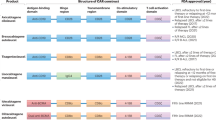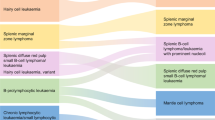Abstract
The aim of this study was to determine whether a very high-risk group based on presenting characteristics could be identified in patients with advanced Hodgkin's disease who may benefit from high-dose chemotherapy (HDCT). Between 1975 and 1992, 453 previously untreated patients aged under 60 years who did not progress in the first 6 months after the start of standard chemotherapy had their hospital notes reviewed. The outcomes analysed were early disease progression (in the 6- to 18-month window following the start of chemotherapy) and disease progression in the whole of the follow-up period. A Cox regression analysis was used to investigate the combined effects of a number of presenting characteristics on these outcomes. Despite the presence of factors with significant effects on the relative rate of progression, the absolute effects in a group identified as having the poorest prognosis were not especially poor. No group could be defined with a freedom from progression rate of less than 70% over 6-18 months, and the worst prognostic group, which included only 53 patients, had an overall freedom from progression rate of 57% at 5 years. Four other reported prognostic indices were evaluated using our data set, but none of the indices was more successful in identifying a very high-risk group. It has not been possible to define a sufficiently high-risk group of patients with Hodgkin's disease based on presenting characteristics for whom HDCT could be advised as part of primary treatment. The search for more discriminating prognostic factors identifying vulnerable patients with a high risk of relapse must continue before a role can be found for HDCT following conventional chemotherapy in patients without disease progression.
This is a preview of subscription content, access via your institution
Access options
Subscribe to this journal
Receive 24 print issues and online access
$259.00 per year
only $10.79 per issue
Buy this article
- Purchase on Springer Link
- Instant access to full article PDF
Prices may be subject to local taxes which are calculated during checkout
Similar content being viewed by others
Author information
Authors and Affiliations
Rights and permissions
About this article
Cite this article
Lee, S., Radford, J., Ryder, W. et al. Prognostic factors for disease progression in advanced Hodgkin's disease: an analysis of patients aged under 60 years showing no progression in the first 6 months after starting primary chemotherapy. Br J Cancer 75, 110–115 (1997). https://doi.org/10.1038/bjc.1997.18
Issue Date:
DOI: https://doi.org/10.1038/bjc.1997.18
This article is cited by
-
Hodgkin’s disease and intercurrent processes that may simulate a relapse
Clinical and Translational Oncology (2008)
-
A prognostic model for prolonged event-free survival after autologous or allogeneic blood or marrow transplantation for relapsed and refractory Hodgkin's disease
Bone Marrow Transplantation (2005)
-
Upfront transplantation for poor-risk aggressive non-hodgkin lymphoma and hodgkin’s disease: Who benefits?
Current Oncology Reports (2001)



